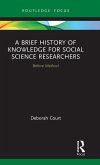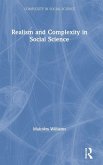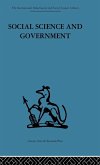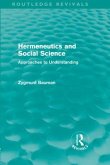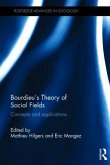Freedom of Information and Social Science Research Design
Herausgeber: Walby, Kevin; Luscombe, Alex
Freedom of Information and Social Science Research Design
Herausgeber: Walby, Kevin; Luscombe, Alex
- Gebundenes Buch
- Merkliste
- Auf die Merkliste
- Bewerten Bewerten
- Teilen
- Produkt teilen
- Produkterinnerung
- Produkterinnerung
This multidisciplinary volume demonstrates how freedom of information law and processes can contribute to social science research design, explores the challenges of using freedom of information processes in research and considers the reasons for which freedom of information processes remain under-used in social scientific research.
Andere Kunden interessierten sich auch für
![A Brief History of Knowledge for Social Science Researchers A Brief History of Knowledge for Social Science Researchers]() Deborah CourtA Brief History of Knowledge for Social Science Researchers65,99 €
Deborah CourtA Brief History of Knowledge for Social Science Researchers65,99 €![Realism and Complexity in Social Science Realism and Complexity in Social Science]() Malcolm WilliamsRealism and Complexity in Social Science176,99 €
Malcolm WilliamsRealism and Complexity in Social Science176,99 €![Concept Formation in Social Science (Routledge Revivals) Concept Formation in Social Science (Routledge Revivals)]() William OuthwaiteConcept Formation in Social Science (Routledge Revivals)117,99 €
William OuthwaiteConcept Formation in Social Science (Routledge Revivals)117,99 €![Philosophy of Social Science Philosophy of Social Science]() Alexander RosenbergPhilosophy of Social Science172,99 €
Alexander RosenbergPhilosophy of Social Science172,99 €![Social Science and Government Social Science and Government]() Social Science and Government394,99 €
Social Science and Government394,99 €![Hermeneutics and Social Science (Routledge Revivals) Hermeneutics and Social Science (Routledge Revivals)]() Zygmunt BaumanHermeneutics and Social Science (Routledge Revivals)180,99 €
Zygmunt BaumanHermeneutics and Social Science (Routledge Revivals)180,99 €![Bourdieu's Theory of Social Fields Bourdieu's Theory of Social Fields]() Bourdieu's Theory of Social Fields177,99 €
Bourdieu's Theory of Social Fields177,99 €-
-
-
This multidisciplinary volume demonstrates how freedom of information law and processes can contribute to social science research design, explores the challenges of using freedom of information processes in research and considers the reasons for which freedom of information processes remain under-used in social scientific research.
Produktdetails
- Produktdetails
- Verlag: Routledge
- Seitenzahl: 268
- Erscheinungstermin: 3. Dezember 2019
- Englisch
- Abmessung: 240mm x 161mm x 19mm
- Gewicht: 570g
- ISBN-13: 9781138345737
- ISBN-10: 1138345733
- Artikelnr.: 58382568
- Herstellerkennzeichnung
- Libri GmbH
- Europaallee 1
- 36244 Bad Hersfeld
- gpsr@libri.de
- Verlag: Routledge
- Seitenzahl: 268
- Erscheinungstermin: 3. Dezember 2019
- Englisch
- Abmessung: 240mm x 161mm x 19mm
- Gewicht: 570g
- ISBN-13: 9781138345737
- ISBN-10: 1138345733
- Artikelnr.: 58382568
- Herstellerkennzeichnung
- Libri GmbH
- Europaallee 1
- 36244 Bad Hersfeld
- gpsr@libri.de
Kevin Walby is Associate Professor of Criminal Justice at the University of Winnipeg, Canada. He is the author of Touching Encounters: Sex, Work and Male-for-Male Internet Escorting and the co-author of Municipal Corporate Security in International Context as well as A Criminology of Policing and Security Frontiers. He is the co-editor of Access to Information and Social Justice: Critical Research Strategies for Journalists, Scholars and Activists; Brokering Access: Power, Politics and Freedom of Information Process in Canada; The Handbook of Prison Tourism; Corporatizing Canada: Making Business Out of Public Service; National Security, Surveillance, and Terror: Canada and Australia in Comparative Perspective; Policing Cities: Urban Securitization and Regulation in a 21st Century World and Corporate Security in the 21st Century: Theory and Practice in International Perspective. He is co-editor of the Journal of Prisoners on Prisons. Alex Luscombe is a PhD Candidate in criminology at the University of Toronto, Canada. He has published widely on issues of policing, corruption, secrecy and Freedom of Information law in Canada and beyond. His past research has appeared in Social Forces, British Journal of Criminology, Sociology, International Political Sociology, Canadian Journal of Criminology & Criminal Justice, Policing & Society, Criminology & Criminal Justice, as well as a number of other academic journals and edited volumes. He serves on the editorial board of Criminological Highlights, a University of Toronto publication aimed at providing criminal justice practitioners with an accessible overview of recent criminological research. He is also a Junior Fellow at the University of Toronto's Massey College.
Foreword: Thinking About Access Introduction: Freedom of Information and
Research Design in International Perspective Part 1: Freedom of Information
and Research Design: The Foundations 1. Designing Research Using FOI
Requests in the USA 2. Accessing Information in South Africa 3. UK
Experience of Freedom of Information as a Method of Enquiry 4. Using FOI to
Explore Governance and Decision-Making in the UK Part 2: Freedom of
Information and Research Design: Disciplinary Applications 5. Freedom of
Information and Australian Criminology 6. Accessing Information in a
Technology Industry: Tracing Canadian Drone Stakeholders and Negotiating
Access 7. Using Continuous FOI Requests to Uncover the Live Archive:
Tracking Protest Policing in the USA Part 3: Freedom of Information:
Triangulation, Data Analysis and Exposition 8. Piecing it Together,
Studying Public-Private Partnerships: Freedom of Information as Oligoptic
Technologies 9. Researching the Complexities of Knowledge Contestations and
Occupational Disease Recognition: FOI Requests in Multi-Method Qualitative
Research Design 10. Repertoires of Empirical Social Science and Freedom of
Information Requests: Four Techniques for Analyzing Disclosures Part 4:
Freedom of Information and Research Design: Challenges and Dilemmas 11.
Analysing Public Policy in the UK: Seeing through the Secrecy, Obfuscation
and Obstruction of the FOIA by the Home Office 12. A Double-Edged Sword?
Freedom of Information as a Method in Social Research 13. The Falling
Currency of Democracy: Information as an Instrument of Control and
Certainty in the Postwar and Post-Truth Eras Postscript: Access in the
Absence of FOI: Open Source Investigations and Strategies of Verification
Research Design in International Perspective Part 1: Freedom of Information
and Research Design: The Foundations 1. Designing Research Using FOI
Requests in the USA 2. Accessing Information in South Africa 3. UK
Experience of Freedom of Information as a Method of Enquiry 4. Using FOI to
Explore Governance and Decision-Making in the UK Part 2: Freedom of
Information and Research Design: Disciplinary Applications 5. Freedom of
Information and Australian Criminology 6. Accessing Information in a
Technology Industry: Tracing Canadian Drone Stakeholders and Negotiating
Access 7. Using Continuous FOI Requests to Uncover the Live Archive:
Tracking Protest Policing in the USA Part 3: Freedom of Information:
Triangulation, Data Analysis and Exposition 8. Piecing it Together,
Studying Public-Private Partnerships: Freedom of Information as Oligoptic
Technologies 9. Researching the Complexities of Knowledge Contestations and
Occupational Disease Recognition: FOI Requests in Multi-Method Qualitative
Research Design 10. Repertoires of Empirical Social Science and Freedom of
Information Requests: Four Techniques for Analyzing Disclosures Part 4:
Freedom of Information and Research Design: Challenges and Dilemmas 11.
Analysing Public Policy in the UK: Seeing through the Secrecy, Obfuscation
and Obstruction of the FOIA by the Home Office 12. A Double-Edged Sword?
Freedom of Information as a Method in Social Research 13. The Falling
Currency of Democracy: Information as an Instrument of Control and
Certainty in the Postwar and Post-Truth Eras Postscript: Access in the
Absence of FOI: Open Source Investigations and Strategies of Verification
Foreword: Thinking About Access Introduction: Freedom of Information and
Research Design in International Perspective Part 1: Freedom of Information
and Research Design: The Foundations 1. Designing Research Using FOI
Requests in the USA 2. Accessing Information in South Africa 3. UK
Experience of Freedom of Information as a Method of Enquiry 4. Using FOI to
Explore Governance and Decision-Making in the UK Part 2: Freedom of
Information and Research Design: Disciplinary Applications 5. Freedom of
Information and Australian Criminology 6. Accessing Information in a
Technology Industry: Tracing Canadian Drone Stakeholders and Negotiating
Access 7. Using Continuous FOI Requests to Uncover the Live Archive:
Tracking Protest Policing in the USA Part 3: Freedom of Information:
Triangulation, Data Analysis and Exposition 8. Piecing it Together,
Studying Public-Private Partnerships: Freedom of Information as Oligoptic
Technologies 9. Researching the Complexities of Knowledge Contestations and
Occupational Disease Recognition: FOI Requests in Multi-Method Qualitative
Research Design 10. Repertoires of Empirical Social Science and Freedom of
Information Requests: Four Techniques for Analyzing Disclosures Part 4:
Freedom of Information and Research Design: Challenges and Dilemmas 11.
Analysing Public Policy in the UK: Seeing through the Secrecy, Obfuscation
and Obstruction of the FOIA by the Home Office 12. A Double-Edged Sword?
Freedom of Information as a Method in Social Research 13. The Falling
Currency of Democracy: Information as an Instrument of Control and
Certainty in the Postwar and Post-Truth Eras Postscript: Access in the
Absence of FOI: Open Source Investigations and Strategies of Verification
Research Design in International Perspective Part 1: Freedom of Information
and Research Design: The Foundations 1. Designing Research Using FOI
Requests in the USA 2. Accessing Information in South Africa 3. UK
Experience of Freedom of Information as a Method of Enquiry 4. Using FOI to
Explore Governance and Decision-Making in the UK Part 2: Freedom of
Information and Research Design: Disciplinary Applications 5. Freedom of
Information and Australian Criminology 6. Accessing Information in a
Technology Industry: Tracing Canadian Drone Stakeholders and Negotiating
Access 7. Using Continuous FOI Requests to Uncover the Live Archive:
Tracking Protest Policing in the USA Part 3: Freedom of Information:
Triangulation, Data Analysis and Exposition 8. Piecing it Together,
Studying Public-Private Partnerships: Freedom of Information as Oligoptic
Technologies 9. Researching the Complexities of Knowledge Contestations and
Occupational Disease Recognition: FOI Requests in Multi-Method Qualitative
Research Design 10. Repertoires of Empirical Social Science and Freedom of
Information Requests: Four Techniques for Analyzing Disclosures Part 4:
Freedom of Information and Research Design: Challenges and Dilemmas 11.
Analysing Public Policy in the UK: Seeing through the Secrecy, Obfuscation
and Obstruction of the FOIA by the Home Office 12. A Double-Edged Sword?
Freedom of Information as a Method in Social Research 13. The Falling
Currency of Democracy: Information as an Instrument of Control and
Certainty in the Postwar and Post-Truth Eras Postscript: Access in the
Absence of FOI: Open Source Investigations and Strategies of Verification



